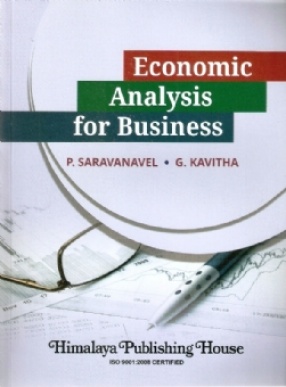Economic Analysis for Business is an interesting and fundamental part of Business Management Administration Curriculum. Mastering the subject requires a good understanding of how basic concepts of economics can be combined with tools of Statistics, Quantitative Techniques, Operations Research, Accountancy, Finance, Costing, etc., to analyse and make decisions involving scarce resources.
This book on ‘Economic Analysis for Business’ is designed to meet the necessary requirements of the knowledge of economics and related subjects in practically all professional and postgraduate courses. The special feature of this book is that it covers topics both on microeconomics as well as macroeconomics relevant to B.Com., B.B.A., M.Com., MBA and other professional courses such as the Institute of Chartered Accountancy, Costs and Works Accountancy, Chartered Secretary, etc. Further, the subject has been explained with practical example and graphical explanations besides extensive illustrative problems with solutions.
Contents: 1. Introduction to Economics: The Themes of Economics. 2. Economic Problems and Production Possibility Frontier. 3. Consumer Behaviour (Cardinal Approach Marginal Utility Analysis). 4. Law of Demand and Demand Analysis. 5. Elasticity of Demand. 6. Indifference Curve Analysis and Revealed Preference Theory. 7. Supply and Elasticity of Supply. 8. Returns to Scale. 9. Analysis of Cost Output Relationship (Cost Function). 10. Economies and Diseconomies of Scale. 11. Market Structure -Perfect and Imperfect Competition. 12. Pricing Under Different Market Structure /Equilibrium of Firm. 13. Factors of Production and Factor Pricing. 14. Circular Flow of Income and Expenditure. 15. National Income. 16. Classical Approach of Income and Employment. 17. Keynesian Approach of Savings and Investments. 18. Multiplier Effect. 19. Demand and Supply of Money. 20. General Equilibrium: An Integration of Product and Money Markets. 21. Inflation, Deflation and Stagflation. 22. Inflation and Unemployment: Phillip’s Curve and Okum’s Law. 23. Macroeconomic Policies – Monetary Policy. 24. Macroeconomic Policies – Fiscal Policy. 25. Supply – side Policy and Management. 26. Market Failures, Externalities and Government Regulation.







There are no reviews yet.